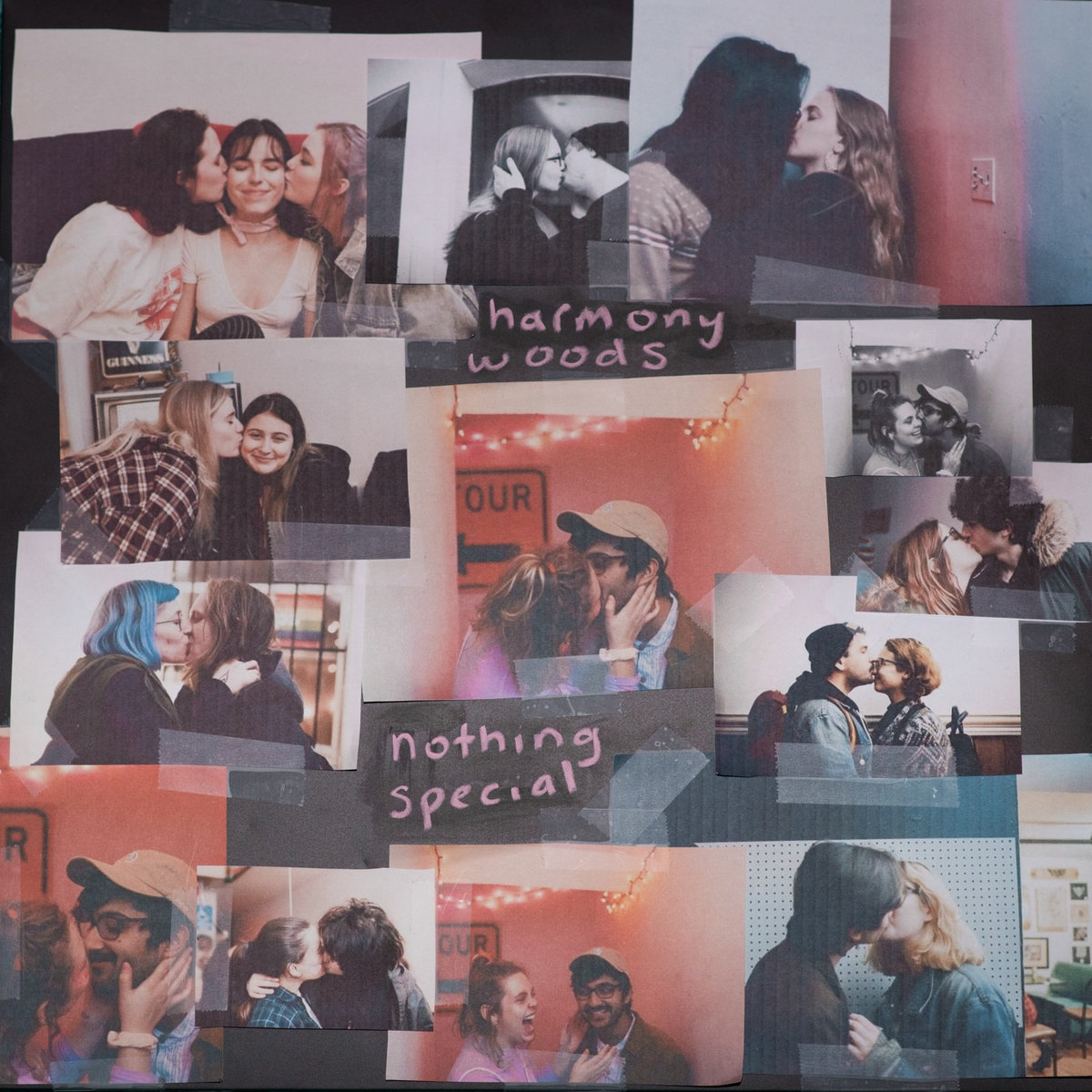Review: Harmony Woods – ‘Nothing Special’
Posted: by admin

On their debut LP Nothing Special, Sofia Verbilla, of Harmony Woods, reintroduces the idea of a love song. The 12 tracks range from thoughtful acoustic meditations on the nature of interpersonal relationships to heavier tracks that sing about “avoiding feelings like the fucking plague”.
As the 30 minutes dance on, the listener gets a clearer picture of what inspired this music: someone. That may sound too vague, but listening to Verbilla soliloquize suffering through uncomfortable public transit rides to see someone, portray not wanting to leave that person’s bed, and recount the location of their freckles brings to the listener’s mind a specific person. Verbilla’s earnest lyrics merged with post-punk melodies become an incredibly effective technique for untangling the difficulties that come along with the relationship she depicts.
The album is tethered by four “Vignettes”. In literature, a vignette is a brief evocative description or a small portrait that fades into its background without a definite border. True to their name, these short songs set the stage on which Verbilla introduces someone.
The album begins with “Vignette #1”, Sofia’s voice twists over climbing acoustic guitar and horn notes. “Do you come here often?” she asks, placing a common pickup line in the context of a genuine and fragile new prospective relationship, budding on the scene of an image-conscious frat party. Verbilla gives listeners a glimpse through a new set of eyes: triumphs, downfalls, and everything in between – and this song is the first page of it all.
In between Vignettes, are tracks describing the relationship as it enfolds. Each track bringing something new to the table lyrically and sonically. Following “Vignette #1”, the tone remains positive during “The Best Things” and then “Jenkintown-Wyncote”, the first single from the album, which symbolically represents the journey these two characters take together throughout the record with an anxiety-filled public transit ride. But it ends with the speaker remembering that “your smile quite frankly / actually reminds me / that things might be okay.” The emotional perceptiveness of the characters Verbilla sings about mirrors that of her songwriting. Many of the songs follow a similar pattern of growth, both lyrically and instrumentally, and are not afraid to use reverb or instruments other than guitar and percussion to highlight their message of of introspection.
“Negro y Azul” takes on a unique tone. Quick, dancing guitar contrasts more serious vocals, and ¾ time keeps up a playful feel. With its title from an episode of the show Breaking Bad, this track describes the little intimacies of relationships, such as watching TV shows together. The speaker suggests moving “on to something a little less dark,” and their new significant other is characterized by their response: “You almost immediately blush, saying ‘I was getting sick of it anyway.’” A lyric threaded throughout the record, “I think I might need you,” closes out the song – for now associating it with only the feeling of being head-over-heels in love.
Presumably the night after the last scene, “Vignette #2” brings you to 42º weather and the song’s speaker internalizing the possibility of “leaving the heat your bed’s supplying me.” The echoing acoustic guitar layered over peacefully delivered lyrics and a muted horn, bring the listener to a place that feels like they’re watching the exchange from outside of a frosted window. An image framed in the minute and 11 seconds, frozen in time.
Good songwriters are able to craft a compelling story, and Sofia Verbilla does just that on this record. The details she includes could be interpreted as mundane, but seeing them through her perspective brings a new spotlight to things like “the freckles on our shoulder, getting older” on “Speckled”. In “Parking Lot” the speaker starts to doubt their feelings, questioning whether the difficulties of the relationship are worth it. By the end of “The Worst Things” the positivity, has evaporated.
More twangy than the others, “Vignette #3” describes a parking lot, mentioned throughout the album – symbolically, a fluctuating space where people come and go. The track allows the speaker’s significant other a line – a rarity on the album – and the speaker themselves lets their guard down emotionally. Guitar provides a foundation for Verbilla’s moderate voice, hushed to a near-whisper at times. This song demonstrates how adept Verbilla is at portraying the emotions of a situation, even without including a great deal of specific context or detail. She alters the sound with subtle static, but the melody remains a perfect stage for the story to continue.
The second single, “Renovations,” follows the same opening pattern as “Vignette #2” with its guitar patterns and first lyric, asking “How do you know when it’s the right time to go?” It ends less dreamily, however, as the couple waiting for the day they’d find their place recognizes that “that day never came.” It is the lowest point in the album’s arc, post-conflict but pre-resolution. The first half of the song is careful and questioning, transitioning in the second half to the most assertive sound on the album. The lyric “The foundation was overlooked / the floorboards are shaking in the room we loved once / is this the end for us?” mirrors the record’s progression content-wise from a budding romance struggling against the odds to two people succumbed to those odds, and later to healing, and finding hope. “Renovations” expresses the speaker’s anger and frustration decisively.
“Vignette #4” is not the last song, but it almost feels that way. It’s akin to turning into your driveway after a long trip; you enjoyed yourself, but are glad to be almost home. This song also brings some of the most heartfelt emotion heard on the entire record. “It’s a sunny day once again / but I don’t have it in me to leave your bed,” the song opens, bringing back to mind the image of a safe warm bed. There is more distinct conflict present now for the speaker: “I can’t bear the thought of seeing you again” and “I’m terrified of what you’ll say.” But these worries are quelled when the person enters the room and lies down on the bed. “You just lie down next to me, our bodies creating heat” is a simple lyric, and a simple exchange, but it is one of the most breathtaking moments on the record, because its simplicity genuinely reflects how this stage of a relationship can feel.
The album ends with “Equinox” a title representing a change from one state to another. Thus, even with it’s static-y, muffled vocals and swirling instrumentals, “Equinox” is more decisive than other songs on Nothing Special: “I was wrong / we are not strong / I don’t think anyone is.” It takes a deep breath from the anxiety that has built up in the second half of the album. It provides closure the struggles felt previously and to some of the symbols from previous songs with lyrics such as, “we’re gonna have to peel the freckles off our shoulders / summer’s getting colder.” While it doesn’t pretend to give any overconfident remedies to relationship struggles, “Equinox” entertains the idea that relationships shouldn’t strive for perfection when it doesn’t exist. It ends the album, but sets both characters down on the bottom of a new staircase.
Love is difficult, and Verbilla doesn’t shy away from recognizing the unhappiness it can bring people. But by simultaneously lighting a flame of cautious hope, Verbilla universalizes her message of trusting people around us, for the joy a connection can bring – when found.
Indie rock is not dead, contrary to a lot of such whisperings in the scene recently. It is artists like Harmony Woods who are keeping it alive, by writing records this full-to-the-brim thoughtful and well-crafted to sink your teeth into. Nothing Special is a journey, a genuine story with character arcs and conflict and a sort-of resolution. It is a concept album, but Verbilla’s own introspective nature shines through so purely that you have to wonder what else inspired it. Artists new to songwriting often run the risk of coming across as unsure, but Verbilla knows what message she wants her work to reflect: be vulnerable, feel and express every emotion you have without hesitation. For an artist’s debut LP especially, this record is a standout. Nothing Special is a nontraditional fairytale of indie rock, and Harmony Woods are without a doubt a band to continue following on their own journey.
9/10
You can get the album on their Bandcamp now, or via Honest Face Records.
– Lucy Danger










